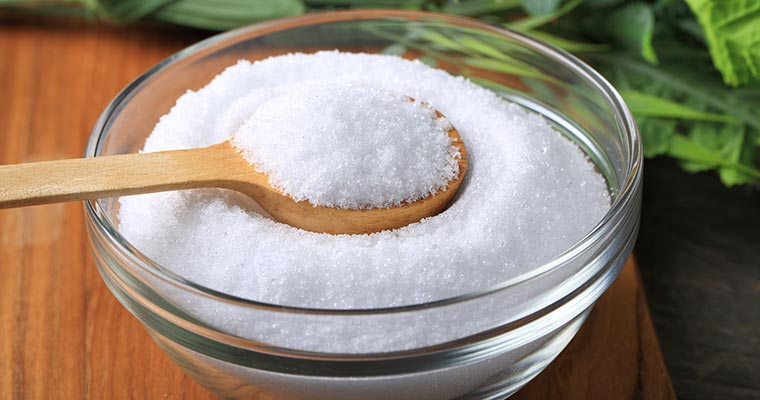We all know sugar is bad for your teeth.
As your body digests sugar, it releases acids that dissolve your tooth enamel, putting you at greater risk for tooth decay and gum disease.
Limiting your sugar intake is one of the best things you can do for your oral and overall health.
However, cutting out sugar entirely isn’t realistic or even necessary for most people. We know we wouldn’t win many friends if we said you could never eat your favorite treats again!
But what if you could enjoy the sweetness of sugar AND protect your oral health at the same time?
It’s possible with our favorite sugar-substitute, xylitol.

What is xylitol?
If you haven’t heard of xylitol before, prepare for your life to get sweeter.
Xylitol is a natural sweetener derived from the fibrous parts of plants. It’s a sugar alcohol found in many fruits, vegetables, and even in the human body.
It looks like sugar and tastes just as sweet, without any unpleasant artificial aftertaste.
Xylitol can be used in many of the same ways that sugar is. It’s commonly found in sugar-free chewing gum, candies, toothpaste, diabetes-friendly foods, and oral care products.
You can even use it as a substitute for sugar in your favorite recipes and baked goods.
Why is xylitol good for your teeth?
Xylitol is clinically proven to improve oral health by preventing cavities and reducing gum disease.
Using xylitol as a sugar replacement reduces your overall sugar intake, significantly improving your oral health.
Xylitol is also lower calorie than sugar, so it’s also a win for your waistline.
But the benefits of xylitol don’t stop at simply reducing sugar in your diet – xylitol actively fights against bacterial growth that leads to disease and decay.
Here’s how it works:
One of the primary risk factors for tooth decay is the oral bacteria responsible for plaque, Streptococcus mutans.
Streptococcus mutans and other harmful oral bacteria feed on sugar, causing them to grow and multiply in your mouth. It’s their favorite food too!
Some amount of plaque and bacteria is normal, but excessive sugar intake can cause it to get out of control.
These sugars produce acids that erode your enamel. Your immune system also recognizes the excess of bacteria and begins to attack it, creating an inflammatory response known as gum disease.
Enter xylitol.
Unlike sugar, oral bacteria can’t metabolize xylitol. When you consume xylitol, you don’t produce the same enamel-destroying acids, and bacterial growth is inhibited.
Even better, while these bacteria can’t feed themselves with xylitol, they still try to ingest it. Their energy receptors get clogged up with unusable fuel, and they eventually starve to death.
While that’s a sad ending for Streptococcus mutans, it’s great news for your oral health.
One study…Opens in a new window to study… found that xylitol chewing gum reduced harmful oral bacteria by 27-75% while keeping good bacteria levels the same.
Where can I buy xylitol?
Xylitol is getting increasingly popular as its health benefits have become more widely known.
While most health food stores carry xylitol, you can find it in many general grocery stores.
Check out the baking aisle for raw xylitol, or find it in the chewing gum products and toothpaste.
If your local grocery store doesn’t carry it, you can easily find it online…Opens in a new window to Amazon link….
Xylitol sounds too good to be true – what’s the catch?
We know! We’re big fans of xylitol for its amazing oral and overall health benefits.
Long-term moderate consumption of xylitol is completely safe.
However, there are still some important points to be aware of:
Like all foods, you should still consume xylitol in moderation.
Some people experience digestive issues if they consume too much.
If you suffer from irritable bowel syndrome (IBS) or other digestive health issues, you should be especially cautious.
It’s best to start with a small amount to see how your body tolerates it. If all goes well, slowly work your way up to higher consumption.
Xylitol can also be toxic to dogs. So if you have pets at home, keep xylitol well out of their reach.
Xylitol and your oral health: the bottom line
Xylitol is an excellent addition to your diet, especially if you’re looking to curb your sugar intake.
However, it’s important to remember that xylitol is just one part of keeping your smile healthy and strong.
You still need to get the foundations right: Brush and floss your teeth daily, and visit the dentist for a checkup and cleaning every six months at a minimum.
If you’re looking for a great dentist in Seattle, WA, Downtown Dentistry can help! Dr. Kathy Curtis has been a top Seattle area dentist for almost three decades.
We proudly serve Seattle and the surrounding areas, including Bellevue, Redmond, Renton, Kent, Capitol Hill, Queen Anne, and South Lake Union.
Schedule an appointment with Dr. Curtis today!
Or you can contact us by one of these other convenient means:

